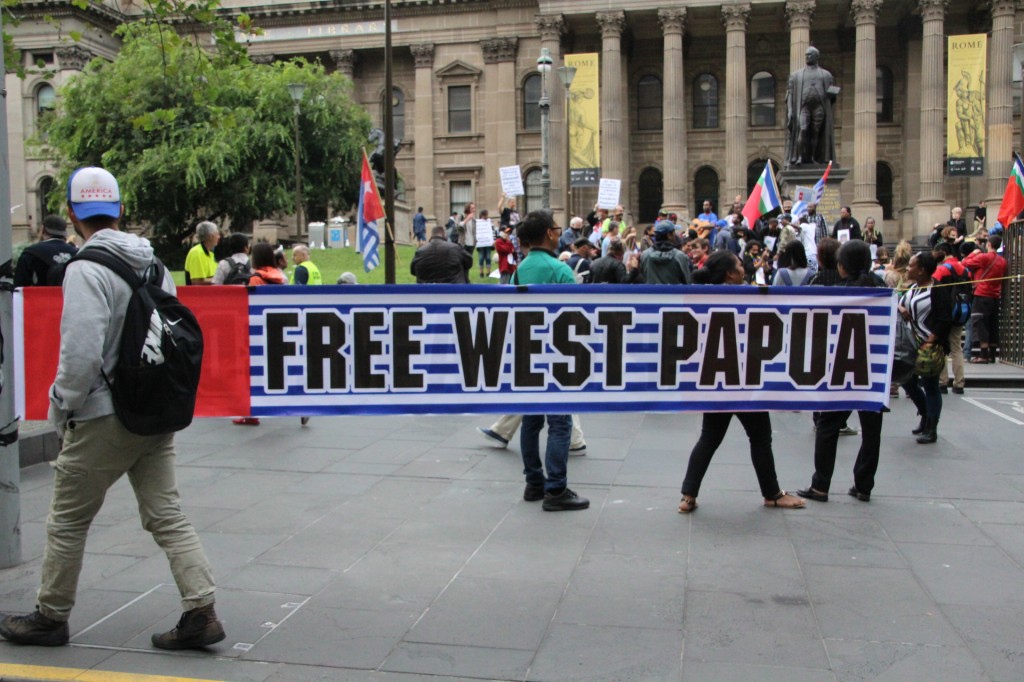
It’s a cold autumn afternoon in Melbourne after a week of soaring heat. It’s been raining all day but it lets up as a small group of West Papuan’s begin setting the banners and signs outside the Victorian State Library.
A large metal cage is put together and the activists who knew about the event beforehand start arriving. Sixta Mambor is a small woman who moves among the small crowd beginning to gather, handing out laminated signs for people to wear along with black cloth to tie over their mouths.
There are trying to get enough volunteers for all of the seventy six signs, one for each of the political prisoners being held in West Papua as well as neighbouring Maluku. Ronny Kareni and a small group of men beginning playing their instruments and singing upbeat songs in Bahasa, they sing the words “Papua Merdeka” over (Papua Independence).
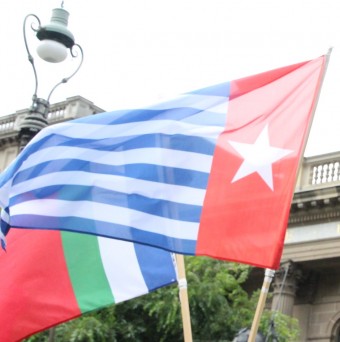
Behind them, next to the old colonial monuments of the State Library, the Morning Star flag flies, the flag of West Papuan Independence. For the young man who raises the flag, the simple act of raising it would carry fifteen years imprisonment back home.
Almost a week earlier I had sat waiting to meet Ronny at the same spot, outside the state library. He was running late and told me to look out for a black t-shirt with Free West Papua on it. As we sat down he took his headphones off and left them around his neck, pulling out the plug and putting it up on the table.
I start by asking him how he became involved and he answered bluntly, “I was born into this conflict,” he said, “At a very young age of three years old, my mum crossed with me and my older sister from West Papua to Papua New Guinea, in the 80s. At that time there were about ten thousand West Papuan refugees, they called them ‘Border Crossers’.
“So while I lived in PNG growing up there were a lot of questions. Why my parents still speak Bahasa? Why they don’t speak the national language in PNG? Also there were always friends and relatives around who would speak about the struggle.”
Ronny looked young, maybe late twenties or early thirties and he moved fast and spoke with his hands, “But it never came to me so simple you know, like this is the political nature of the situation, until I came to Australia, in 2003.
“Prior to that for three years there were lots of workshops for many of the university students who were taking the front line in the non-violent struggle. Learning about the consequences of non-violence and studying other movements like in India and South Africa and drawing from those experiences. So from that they decided to send six students to study abroad and I was one of the students in that program.”
Ronny is now one of many West Papuan activists based out of Melbourne trying to promote awareness about the situation in West Papua and garner support for the independence movement. Ronny is one of the hosts of a radio show on 3CR called the Voice of West Papua and he also part of a band called Rize of the Morning Star and talks of music as an important way of engaging people.
The movement has been engaging socially conscious artists to get involved and have worked with Australian artists Blue King Brown and The John Butler Trio who have been supportive. Rise of the Morning star have in the past played gigs in PNG and Vanuatu and have just returned from a tour for Womadelaide and Womad New Zealand.
“For us it’s about spreading the word, educating the people about what’s happening in West Papua. Without very much politicising or radicalising what’s happening, simply taking the political nature of the whole issue and saying hey, you can do it on a different level by supporting music as great thing.” Ronny said.
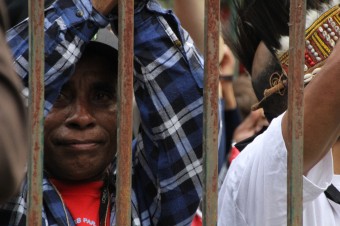
While Indonesia was independent from the Dutch in 1949, West Papua remained under Dutch control and in 1957 the Dutch began a roadmap for West Papua as an independent nation. Indonesia however pushed the Netherlands militarily to step down and in 1962 with US approval Indonesia took control of West Papua. West Papuan’s have resisted Indonesian rule since, for years in the form of civil war but in the last decade almost all the violence has died down and resistance now comes in the form of peaceful demonstrations.
Too close to home for comfort
While Ronny talked fast with enthusiasm when talking about the power of music he grows solemn when asked about what is going on in West Papua. The picture isn’t a pretty one. In their 2012 report Human Rights Watched described, “Deep military paranoia in Papua that conflates political expression with criminal activity,” adding that the “Indonesian military monitors peaceful activists, politicians and religious clergy in Papua and those listed as targets have faced arrest, imprisonment, harassment, or other forms of violence.”
Not many Australians have any knowledge of what is going on in West Papua and what the Papuan’s describe as their ‘silent genocide’, (Kristian Lasslett, a Lecturer in Criminology at the University of Ulster in Northern Ireland, writing for Aljazeera suggested it be called a ‘censored genocide’ instead). However while the issue is unknown to many Australians, it is not just our geographical closeness that puts us uncomfortably close to the abuses in West Papua and increases our responsibility to be aware.
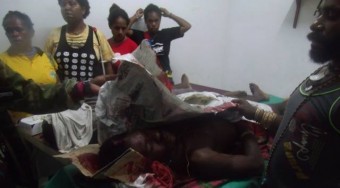
Following 9/11 the Australian government grew increasingly concerned about the threat of terrorism in Indonesia and through the Australian Federal Police trained an elite Indonesian anti-terrorism unit ominously named Detachment 88.
D88 has been highly active in West Papua, with allegations of the use of torture against peaceful independence activists, as well as the assassination of West Papua National Committee leader Mako Tabuni in August 2012 on the street in broad daylight. Despite the killings and human rights abuses being well reported on by organisations such as Amnesty International, Human Rights Watch, as well as the ABC and Fairfax, the AFP continues their funding to D88.
The Australian government won’t change its stance voluntarily, that’s why instead the movement are trying to raise awareness among Australians to pressure their government. Ronny talked slowly and calmly knowing what he wanted to say and always building slowly towards the point.
“The fundamental here is that Indonesia and the world, especially the US, Australia, UK are continuing to give Indonesia the hope that they can still repress and hold on to West Papua. Indonesia knows that they lost the battle for Papua but the western allies are giving them hope to continue.
“They know they will be protected because of the US interest in West Papua, and Australian investment too. West Papua is in an entangled world of outsider’s economic and political interests,” Ronny told me, shaking his head.
Rio Tinto has invested hundreds of millions of dollars into the infamous Grasberg mine in West Papua and the mine is the largest single producer of copper and gold in the world. Australian logging companies also have invested heavily in West Papua, buying concessions of land to log from Jakarta without any considerations for the people who may live there.
West Papua on the Radio
Ronny invites me to come along to the radio show they have on 3CR on Monday nights. At the Fitzroy office I meet Ian Okoa, Sixta Mambor and Erwin Bleskadit the other Papuans working on the show with Ronny. They are finishing writing up their material for the show and Ian sits in the kitchen with me plucking a small ukulele as he goes over his script.
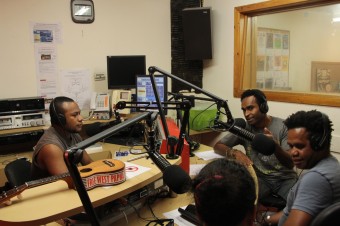
The show before finishes and we pile into the tiny studio, I manage to fit in the corner taking photos while Ian fades out the Papuan music and they go live on air. The show is a strange sort of West Papuan variety half-hour and it shifts gears quickly. It starts slow as Ronny talks about two Indian twins who recently climbed Carstensz Pyramid in West Papua as a part of their journey to climb the highest Mountains on every continent in the world.
The next minute they are plugging the rally at the State Library the coming Wednesday urging people to come down. Ian begins pushing what they want from the Australian government, “They are obliged to push the Indonesian government, people are being imprisoned just for expressing themselves. Australia give millions of dollars every year to the Indonesian government they have a right to a voice,” Ian says.
Ronny picks up off Ian, “What about recently, there was this APEC meeting in Bali when three West Papuan students climbed the wall of the Australian consulate. Didn’t the Prime Minister Tony Abbott came out and said they won’t tolerate any ‘grandstanding’ of separatism? ‘Grandstanding’ was the word used. What do you think of this?”
“I think there is a reason West Papuan people are being really separatist,” Ian says, “because of the injustice that is being conducted by Indonesia and supported by the UK, US and Australia, I think the people can’t wait any longer. Because if you wait any longer in fifteen years there’s not going to be any West Papuans left who are West Papuans, so people are doing any means to express themselves and to get the media to cover it.”
Ronny turns to Ian again, “So we are going to come out in Melbourne to express what is happening in West Papua and that is part of our right to freedom of expression and freedom of assembly in a democratic society like Australia. Are we grandstanding?”
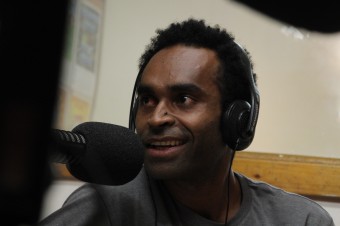
“Yeah, pretty much you a breaching the law,” says Ian nodding his head.
“Are we breaching the law?” says Ronny with a smile, clearly warming up.
“Yeah we are breaching the law. The Lombok treaty was in 2006 after the arrival of forty two West Papuan refuges in Australia and it says the Australian government respects Indonesia sovereignty and territorial integrity. So any acts of ‘separatism’, if you conduct that Australia you are breaching the law.”
Ronny picks up from Ian again, “It’s a trade and security treaty but in one of the clauses, clause 2.3 states that the Australian government doesn’t recognise or support any form of separatism movement. So the Australian government has been silent on actions in West Papua and has come out against any actions such as grandstanding.
“But this is a democratic society here in Australia,” Ronny continues, “where every individual has the liberty to express their rights and their views in and opinions in any way, but that’s not happening in West Papua. In fact that the Australian government has been radically blind and not listening, not taking into serious consideration the gross human rights abuses there.”
After going on detailing the abuses and the attacks students have recently come under at the University in West Papua, Ronny looks up at the clock, it reads 6: 53. “Well our time is catching up its seven minutes to seven. So basically a quick update as well for the soccer, when does the season start?” The change of pace is jarring and Erwin begins updating the latest going on with the Morning Star FC’s matches in Melbourne.
Flying the flag
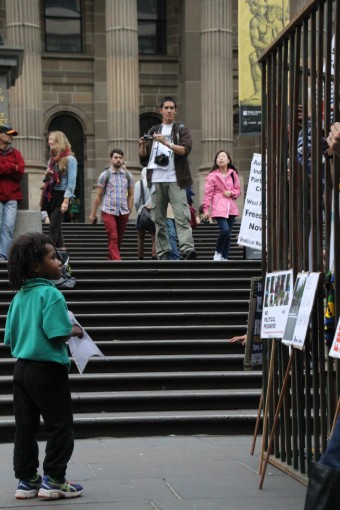
Sixta is talking about her experiences growing up with her father a political prisoner to the growing crowd of onlookers who have stopped at the attention grabbing imagery of almost twenty people with their mouths bound standing in a cage on Swanston Street. The generator faults and her microphone dies, Ronny and the others begin playing music again while it take about ten minutes to get the amplifier working.
Still people are stopping, engaging, taking photos and talking to the activists down there, learning about what is going on. Ronny sees this all as a success and the group have and will continue running events like this to raise awareness.
The event coincides with events in New Zealand and the UK calling for global solidarity and the release of political prisoners. Around two hundred students gathered in West Papua as well despite being denied permission to gather from the Indonesian police. Two of the students were reportedly arrested.
West Papua seems a world away from the Library steps and the link seems so tenuous, but Ronny and the other activists remain motivated and committed. They keep flying the Morning Star flag, and they keep singing, talking, explaining the human rights abuses to anyone who will listen. The message they give to everyone is simple and they give it again and again and again; Free West Papua, Papua Merdeka.
—-(The Australian Department of Foreign Affairs and Trade declined to comment to Peril Magazine’s questions regarding Australia’s involvement in West Papua. The Indonesian Embassy in Canberra did not respond to requests for an interview.)

